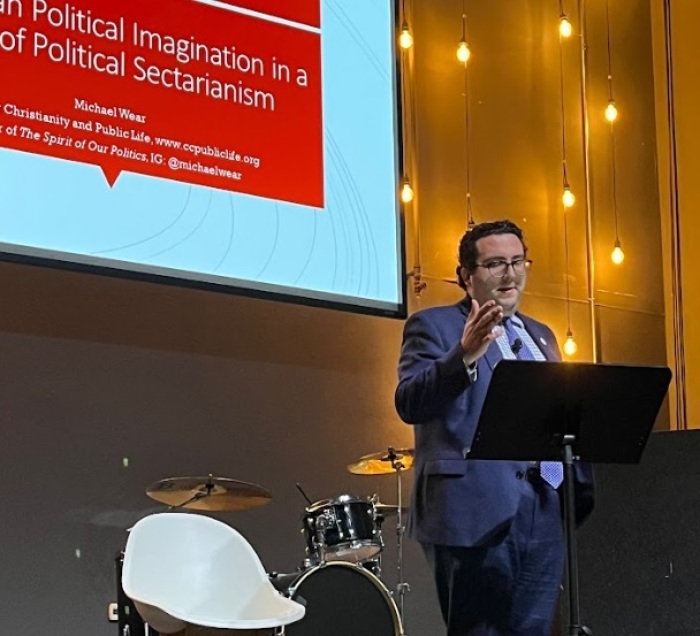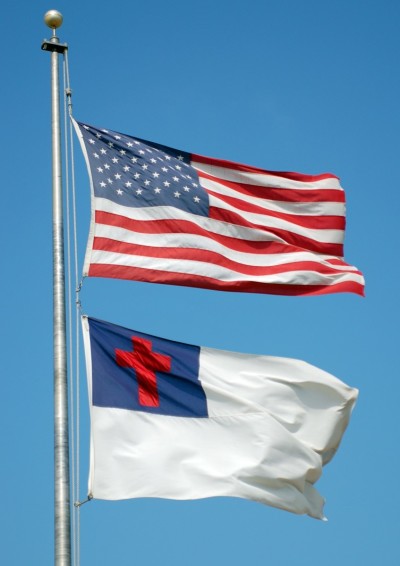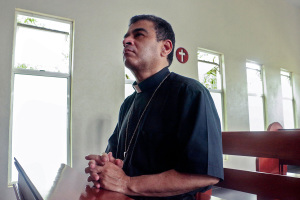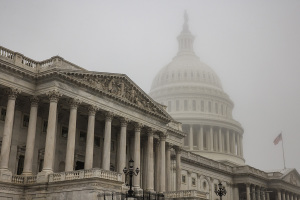Michael Wear talks ‘politics-sorting churches,’ Christian nationalism and if Biden will run a 'post-Christian' campaign

RICHMOND, Va. — Former Obama administration official Michael Wear spoke with The Christian Post about various issues connected to the current political climate in the United States, including his views on the term Christian nationalism and the role of churches in political discourse.
The founder and CEO of the Center for Christianity and Public Life, Wear was the keynote speaker at an event held at the nondenominational Hill City Church on Thursday evening titled “The Spirit of Our Politics.”
The event was named after Wear’s most recent book, released last month, titled The Spirit of Our Politics: Spiritual Formation and the Renovation of Public Life.
Approximately 150 people attended the event, which was sponsored by three Richmond-based Christian groups: Needle’s Eye Ministries, For Richmond, and the Richmond Christian Leadership Initiative.
“Politics is causing great spiritual harm, and the big reason for that is that Americans, including many Christians, are going to politics to get their spiritual needs met,” Wear told those gathered.
“Our politics is doing great harm materially and spiritually, and if that is to change, it is vital that we recognize the ways in which our politics is out. If we were a different kind of people, our politics would be different. I want to talk to you, this evening, about the space politics is taking up in your life.”
During his remarks, Wear spoke about “politics-sorting churches,” or congregations that intentionally seek out members and attendees who subscribe to their politics.
When asked by CP how such churches can change their direction, Wear responded that “different things are happening in different churches,” as sometimes a church might be “actively pursuing a strategy of attracting people on the basis of political views, and I am not sure my advice is going to be helpful there.”
Wear believes that “we need to have a view of politics that is not over the Gospel or outside and irrelevant to the Gospel, but a view of politics that is within and under the Gospel.”
“Jesus has to be at the center of our churches, and when Jesus is at the center, Jesus naturally attracts people of all kinds of views and backgrounds,” he added.
Democrats and a ‘post-Christian’ campaign

In 2018, at an event hosted by Georgetown University's Initiative on Catholic Social Thought and Public Life, Wear criticized Hillary Clinton's presidential campaign for running a "post-Christian" campaign that didn't do enough to attract faith-based voters.
“I had heard from someone close to the Clinton campaign that one of their senior advisers boasted they would run the first post-Christian campaign,” said Wear in 2018.
“That is a great strategy, except for the fact that 70 percent of Americans consider themselves to be Christian. Maybe that is aspirational from their perspective, but what kind of data-minded campaign looks at a country ... and says we are going to run the first post-Christian campaign? A losing one.”
When asked by CP if he believes President Joe Biden will also run a post-Christian campaign for reelection, Wear replied, “I don’t think Biden did in 2020, and we’ll see what happens in 2024.”
Wear noted that the 2020 Biden campaign “was operating in a world in which they were attentive to the role of religion in American life,” while the 2016 Clinton campaign “seem to have a proactive strategy that required ignoring religion.”
“I will say, I think Biden had a significant improvement over Clinton’s support among Evangelicals. I think it’s always harder to sustain an improvement like that over reelection for a number of reasons,” he continued.
Christian nationalism

Wear was asked by CP for his opinion about Christian nationalism, namely whether he believes it's a genuine political and spiritual threat to America or if it's just a derogatory term to malign conservative Christians.
“I think it depends on what Christian nationalism you are talking about,” he said, adding that “there’s a range of definitions” different people use.
“Christian nationalism is used by some to carry out the same political arguments that we’ve been having for the last 30-40 years,” said Wear. “But I do think that there is a way in which the term identifies what I think is a fairly marginal group that isn’t even necessarily practicing Christianity, but they leverage religious symbols, rhetoric, to promote political violence, for instance, and it’s that that I’m concerned about.”
Wear added that using the label Christian nationalism to describe people has “become counterproductive,” believing that the term “has become so misused.”
“I refuse to cede the label ‘Christian’ to a movement that some advocates using the term want to place on people who would stand and clap when a politician says to them, ‘I know Jesus teaches that love your enemies stuff, but don’t try that in politics,’” said Wear.
“I’m not going to call a group of people who stand up and clap for that — that Jesus’ teachings don’t hold up in real life — Christian nationalists. There are other terms to use for that group.”
He went on to say that “to the extent that Christian nationalism has to be rejected, the problem is not that it’s too Christian, it’s that it’s not Christian enough.”
“It’s not oriented towards the good of our neighbors, towards the good of our public, and therefore, it’s not Christian in its character,” said Wear.
When asked what he hoped attendees at Hill City took away from his speech, Wear said he wanted them to know “that the kind of people we are has much to do with the kind of politics we have and that spiritual formation is essential to civic renewal.”
“The way of Jesus is viable in public life,” said Wear. “We can trust Jesus.”





























